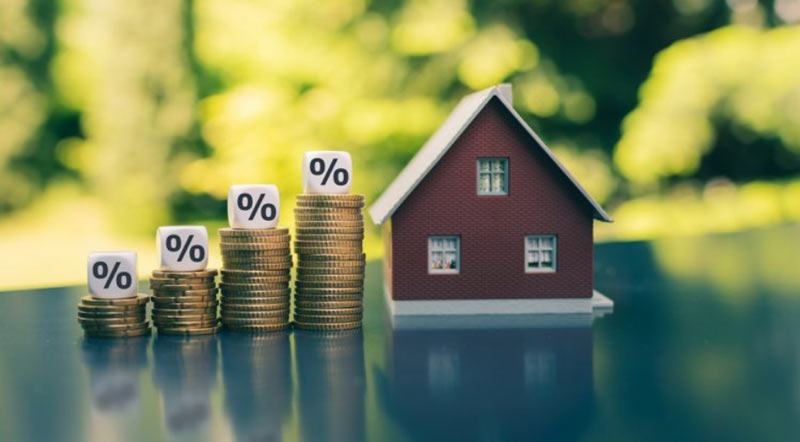Ever wondered what factors influence mortgage rates? If so, then you’re in luck! Today we’ll dive into the world of mortgages and explore one major factor that impacts them: The Federal Reserve.
As the central banking system within the US, this institution exerts tremendous influence on interest rates - including those on your home loan. Let's look at how this works and better understand its impact on real estate financing!
What is the Federal Reserve
The Federal Reserve (also known as the Fed) is a decentralized central banking system in the US. It was established in 1913 to provide stability and oversight for the nation's economy and financial systems. The Federal Reserve’s primary goal is maintaining full employment and price stability by controlling inflation, interest rates, currency circulation, and other economic activities.
The Federal Reserve comprises 12 regional reserve banks, each with its president and board of directors. These 12 banks are the backbone of the Fed's structure and influence many aspects of our economy, including mortgage rates.
How the Federal Reserve affects mortgage rates
The Federal Reserve directly impacts mortgage rates, as it sets the federal funds rate (also known as the "overnight rate"). This is the rate at which banks lend money to one another for short-term loans. Other interest rates and mortgages become more expensive when the federal funds rate rises.
When the Fed lowers the federal funds rate, it can encourage lenders to offer better mortgage rates. Additionally, the Fed's Quantitative Easing program has also had an impact on mortgage rates. This is a tactic the Federal Reserve uses to influence long-term interest rates by purchasing Treasury bonds and other securities from banks. As a result, banks have more money of their own, which they can then lend out at a lower rate, which can be passed on to mortgage borrowers.
The Federal Reserve also indirectly impacts mortgage rates, as it affects the overall economy. Lenders are more likely to offer better mortgage deals to attract new customers when the economy is strong. On the other hand, when times are uncertain, and the economy isn’t doing well, lenders tend to offer less favorable rates as they worry about their borrowers’ ability to pay.
Rising rates could mean more expensive home loans
When the Federal Reserve increases the federal funds rate, it can directly impact mortgage rates. When interest rates rise, so do the costs associated with borrowing money, including mortgage-related ones. This means that borrowers may end up paying more for their home loans than they would if rates had stayed low.
Rising mortgage rates could be especially problematic for those already in a tight financial situation. Homeowners needing help to make their mortgage payments might have even higher costs, making it more difficult to keep up with their payments. This can put them at risk of foreclosure since they may no longer be able to afford their monthly mortgage payments.
For potential homebuyers, rising rates could also mean more expensive mortgages. Mortgage payments can already be quite costly, so an increase in rates could make them unaffordable for some people looking to purchase a home.
Rising interest rates may drive home prices down
When interest rates rise, borrowing money increases, making mortgages more expensive for potential homebuyers. Since fewer people will be able to afford these higher payments, it could cause a decrease in demand for homes. This could lead to lower home prices as sellers become more willing to accept offers that are lower than their asking price.
For current homeowners, a decrease in home prices can mean equity losses. Homeowners who purchased their homes when prices were higher may owe more on the mortgage than the property is worth. This could make it difficult to refinance and can also lead to problems if they decide to sell.
In addition, a decrease in home prices could also result in fewer people being able to qualify for mortgages. Since lenders look at home prices when evaluating borrowers’ ability to repay their loans, it could become more difficult for some people to obtain a loan if prices fall too low.
Rising interest rates can lead to decreased demand and lower home prices in some areas. This could be especially problematic in areas with significant appreciation over the last few years. Homeowners and potential buyers should know this risk to make informed decisions regarding financing or selling a home.
While rising interest rates can have negative consequences for homeowners, it’s important to note that there are also positives associated with these increases. Higher rates can encourage people to save more and spend less, which can help to stimulate the economy.
Comparing the initial costs of owning vs. Renting
When it comes to deciding whether to rent or buy, the upfront costs associated with each option should be taken into consideration. For those considering buying a home, several fees must be paid before closing the loan. These include a down payment (ranging from 3-20%), closing costs (ranging from 2-5% of purchase price), and other upfront costs such as mortgage insurance, home inspections, appraisals, and title work.
The upfront costs are usually much lower for those considering renting a property. Generally speaking, renters will need to pay the first and last month’s rent and a security deposit (typically equal to one month’s rent). They may also need to pay application and credit check fees, pet deposits, or other non-refundable fees.
Another factor to remember when calculating the upfront cost of the renting vs. buying is the time needed for loan approval. Buying a home can be lengthy, as it takes time (up to 45 days) for lenders to approve a loan. Conversely, renting is much faster and can be completed within a few days or weeks.
FAQs
What is the current federal funds rate?
The current federal funds rate is 0.25%, near historic lows. This low rate has allowed for more affordable mortgages and other types of financing.
How can rising rates impact homeowners?
Rising interest rates can directly impact mortgage costs, as borrowers may end up paying more for their home loans than they would if rates had stayed low. For those already in tight financial situations, higher mortgage payments could lead to difficulties making payments - which puts them at risk of foreclosure.
How can rising rates impact potential homebuyers?
Rising mortgage rates make homes more expensive for potential buyers, as the higher payments may become unaffordable for some people looking to purchase a home. Additionally, if interest rates rise too high, it could cause a decrease in demand and lower home prices, further reducing affordability.
Conclusion
Understanding the factors influencing mortgage rates is essential to making wise decisions regarding financing or selling a home. By understanding how the Federal Reserve impacts interest rates, homeowners and potential buyers can be better informed when making these important decisions. Knowing this information ahead of time can help individuals determine which option makes the most financial sense for their particular situation and ensure they’re prepared for any changes in the market.





